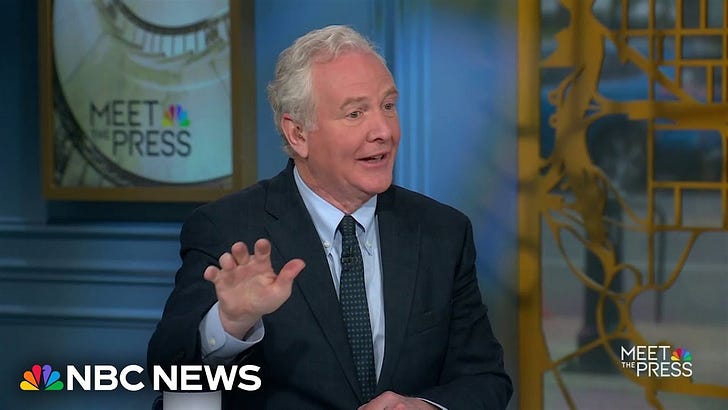Elissa Slotkin Has One Easy Trick For Democratic Party Success: Quad Charts
She has a focus group for that.
Elissa Slotkin received about 23,000 fewer votes in Michigan than Kamala Harris. The reason she won her Senate race is that a decisive number of Donald Trump supporters voted only for him and left the rest of the ballot blank. (There’s even an option to vote straight-party ticket!) It’s encouraging that Trump’s cultish appeal lacks coattails, but that doesn’t mean Slotkin actually connected more with Michigan voters than Harris.
However, the freshman senator nonetheless has opinions on how Democrats can prevail in future elections, when Republicans might actually vote for down ballot candidates. She told Politico that a “focus group” of Michigan voters described the party as “weak and woke,” so Democrats should abandon “wokeness” because nothing conveys strength more than altering your brand based on random focus groups. (Watch below.)
When Democrats like Slotkin embrace and normalize bad-faith Republican rhetoric, they concede that the GOP “war on woke” is actually legitimate. Republicans never do this. Democrats tried marginalizing MAGA with repeated negative references to “MAGA Republicans,” but Republicans collectively united around the term. Jane Fonda recently said, “Woke just means you give a damn about people.” That’s a pretty simple and straightforward definition that Democrats could embrace, rather than running home and crawling under their bed. As the trickster god Q (John de Lancie) might say, politics isn’t for “the timid.” (Watch below.)
Yes, there are liberals out there saying and doing stupid crap that Republicans eagerly label “woke,” but Democrats could just ignore them and instead hammer Republicans on what their party openly supports.
Slotkin is convinced, though, that focus-group tested language is the solution.
She argues that Democrats should stop describing Trump’s obvious oligarchy as an “oligarchy,” because she thinks it confuses average people whose intelligence she clearly doesn’t respect. Instead, Democrats should just say they oppose “kings.”
Slotkin’s argument doesn’t make a lot of sense. Most voters know what “oligarchy” means, and it’s Democrats’ job to inform those who don’t. Donald Trump frequently smeared Democrats as “Marxists,” hardly a third grade reading level term, and as early as 2021, Marco Rubio argued that “social justice and wokeness are just nice names for cultural Marxism, which teaches our children to hate our American history and sow division.” Notice what Rubio does here: He acknowledges that “social justice” and “wokeness” sound like good things! So he directly associates it with something scary and bad. He then clearly defines cultural Marxism on his terms. Three years later, your Fox News-watching grandmother who never attended college was reflexively calling Harris a “Marxist.” Republicans shape public opinion with their messaging, while Slotkin doesn’t even try. Worse, she adopts verbiage like “woke” only after the GOP has tainted it. That’s not very “woke” but it’s definitely “weak.” Pete Buttigieg is naturally a good communicator but he’s also bold enough to defend terms that Republicans demonize. That’s true leadership. (Watch below.)
Saying the party opposes “kings” misses the point, considering that Trump and Musk specifically claim that they represent popular will. An oligarchy can maintain the veneer of democracy while exclusively serving the wealthy. Trump is objectively not a king, whose title is inherited. Also, King Charles is a well-known monarch who actually obeys norms and separation of powers. Trump is a wannabe despot.
Sneering at “oligarchy” is an obvious dig at Rep. Alexandria Ocasio-Cortez and fellow Sen. Bernie Sanders. (Although even moderate Sen. Amy Klobuchar has called out the “Broligarchs.”) Ocasio-Cortez has suggested that certain focus-group savvy Democrats might reject “oligarchy” because they don’t want to offend their rich donors, who kind of like oligarchies, especially if they’re the ones in charge.
Slotkin has argued that Democrats need to stop talking like they’re in the “faculty lounge,” yet like Buttigieg, AOC is very good at breaking down complex issues in a conversational manner that’s never condescending. (Watch below.)
Ocasio-Cortez actually outperformed Kamala Harris in her district in both raw votes and vote share. She’s not the radical, far-left pariah James Carville and others suggest. Many Trump voters in her district actually like her. A consistent theme from overlapping supporters is that she cares “for the working class,” “push(es) boundaries and force growth,” “signaled change,” and is less “establishment” than traditional candidates.
These facts are inconvenient to the Democrats who resent Ocasio-Cortez and are convinced she has no appeal beyond college campuses and hipster coffee shops. Their idea of a Democratic candidate with crossover appeal is still rooted in 1996 when Republicans dominated the suburbs. Trump’s irregular working-class voters are anti-establishment and prefer candidates who appear authentic and say what’s on their mind without consulting focus groups. AOC fits that description far more than Slotkin, who attended private school. Even voters who don’t know what oligarchy means understand that AOC has an actual working class background. Slotkin studies the working class in a laboratory setting. For instance, she’s sending emails to supporters about “bringing alpha energy back to the Democratic Party.” This reminds me of the Will & Grace line about how people who are truly kinky never use the word “kinky.” There’s probably nothing less “alpha” than using the phrase “alpha energy.” (Watch below.)
In another tedious interview Slotkin gave Time, she described how she determined what part of Trump’s fascist horror show she’d personally prioritize.
I'm a national-security person, so I made a quad chart. The top axis is tactical and strategic: when Trump announces something, is it tactical (meaning short term) or is it strategic (long term)? And then on the other axis of the quad chart: is it reversible or irreversible? Can a new president or a new Congress come in and reverse his bad choice, or is it permanent? And I decided to work on the issues that fell into the quadrant that was both strategic and irreversible.
Slotkin doesn’t sound like an American who has a core set of beliefs she’s willing to passionately promote, regardless of how the wind is blowing. She sounds like a politician who is desperate to remain in power and advance her own career. You hold focus groups and study quad charts when considering whether to launch a new smart phone update. You shouldn’t resort to this when defending constitutional democracy against fascism.
If Slotkin was serious about dealing with the supposed view that Democrats are “weak,” she would loudly call for Chuck Schumer’s removal as Senate leader. Instead she danced around the issue, demonstrating that she can’t even pick a fight with the Senate leadership equivalent of a paper bag.
Of course, Democrats like Slotkin wouldn’t know how to respond to electoral losses if they couldn’t blame the party’s left wing, but the “woke” dismissal also alienates potential allies among mainstream Black Democrats who don’t appreciate the scapegoat treatment.
Look, I appreciate that many Democrats prefer a mainstream liberal, maybe even overtly moderate, candidate who talks sensibly about upholding norms, but AOC isn’t stopping them from holding their own rallies or town halls. Chris Van Hollen made headlines with bold action against the Trump administration. He didn’t consult a focus group or a quad chart ouija board before traveling to a Salvadoran prison to meet with Abrego Garcia and demand his safe return.
We should stop pretending that the “safe” candidate is the slam dunk winner at the ballot box. Joe Biden’s 2020 victory was likely a pandemic-related fluke but he also greatly benefitted from serving with Barack Obama, who was hardly the safest, more experienced choice in 2008. However, like Bill Clinton before him, he didn’t come across like a packaged product.
Mainstream Democrats are probably loath to admit this, but the winning presidential candidates for the past four decades were always the one voters considered the coolest, and Senator Quad Charts would not win a coolness contest against famously dull UK Prime Minister Keir Starmer.






Nailed it again, Stephen! You have precisely described my opinion about the Dems, and about politicians writ large. Authenticity will attract support, and shilly-shally mush-mouthed, non- answers to simple questions will repel them.
If your only principle is "Vote for me, and I'll do good things but I can't say precisely what I stand for" you should go home and sit the fuck down. If you are afraid to take a clear stand on anything, go away. I don't have to agree with your every statement, but I can't support anyone who plucks their opinions from a focus group, and lets their own handlers water them down.
“Democrats like Slotkin wouldn’t know how to respond to electoral losses if they couldn’t blame the party’s left wing.”
I think you’ve hit on the core problem within the Democratic party these days. The recalcitrant old-school Dems are reluctant to forfeit having it both ways, by attacking Repubs AND their party’s own “radical” party faction, in order to preserve their comfortable political careers. But they can no longer fight us all. Lead, follow, or get out of the way, Democrats.